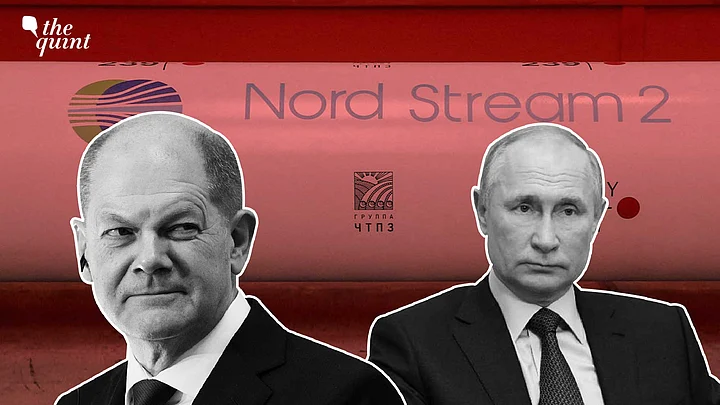As the global community steps up to condemn Russia's invasion of Ukraine, the response of one North Atlantic Treaty Organization (NATO) member in particular – Germany – has gone through remarkable shifts in stance and policy within the past week.
Germany's foreign policy and position on measures against Russia's invasion of Ukraine have been upended in three significant resolutions announced by the country this week.
In order to adhere to the consensus of its European allies and to discourage Russia's violent intrusion, the country has pulled volte-faces in decisions relating to banning Russia from SWIFT, the Nord Stream 2 pipeline, and the supply of arms to Ukraine.
1. Shift of Position on Russia Ban From SWIFT
In the most crippling sanctions imposed on Russia so far, the US, UK and the EU on Saturday, 26 February, announced the expulsion of a number of key Russian banks from the Society for Worldwide Interbank Financial Telecommunication (SWIFT) – an international finance system that allows Russia and others to move their money around the world.
Days before the move, German Chancellor Olaf Scholz had said that cutting off Russia from the global interbank payment system should not be part of the second EU sanctions package against Russia, as per news agency Reuters.
"In terms of unity and determination, it is very important that we decide on the measures that have now been prepared over the last few weeks, and reserve everything else for a situation where it is necessary to do other things as well," Scholz had said at a summit of EU leaders on Thursday, 24 February, alluding to SWIFT.
Germany and other EU countries use SWIFT to pay for Russian gas. Removing Russia from the banking system would mean that "there is a high risk that Germany will no longer be supplied with gas or raw materials," German Finance Minister Christian Lindner had said on German ARD television.
Fears that the ban could force Russia to move to another financial messaging system such as one developed by China, had also been one of the factors for hesitation in finalising the decision.
As the Russian invasion of Ukraine continued, Germany's reluctance seemingly softened to support the values of "freedom of democracy" that Ukraine is fighting to protect.
"The people of Ukraine are fighting for freedom and democracy – values that we share with them. We are on their side. We will therefore be supplying them with defensive weapons. And we have therefore approved tough sanctions such as cutting Russian banks off from SWIFT," Scholz said on Saturday.
2. Suspension of Nord Stream 2 Pipeline
Hours after Russia recognised the independence of separatist-controlled Donetsk and Luhansk in eastern Ukraine, German Chancellor Olaf Scholz on Tuesday, 22 February, announced the halting of the certification of the controversial Nord Stream 2 pipeline.
Nord Stream 2 is a $11-billion natural gas pipeline that stretches from Russia to Germany, spanning more than 750 miles under the Baltic Sea.
The pipeline had been a point of friction between Germany and the US, which had opposed the deal between Russia and Germany, saying that it would make Europe heavily dependent on Russia for energy supplies, giving Russia geopolitical leverage.
On 21 December 21, 2019, then US President Donald Trump had signed a bill that imposed sanctions on any firm that aids in the building of the pipeline. Germany, which relies almost solely on natural gas imports, however, had resisted the US' disapproval, stating concerns of energy-starvation.
"The situation today is fundamentally different and that's why we must re-evaluate this situation, in view of the latest developments. By the way, that includes Nord Stream 2," Scholz had said on Tuesday. "Without this certification, the pipeline cannot go into operation," the German chancellor had added.
3. Divergence From Arms Policy to Export Weapons to Ukraine
"The Russian invasion marks a turning point. It is our duty to support Ukraine to the best of our ability in defending against Putin's invading army. That is why we are delivering 1,000 anti-tank weapons and 500 Stinger missiles to our friends in Ukraine," Scholz announced on Saturday.
The decision to provide arms to Ukraine came as an unprecedented one in Germany's foreign policy, which observes restraint on the export of weaponry to war zones, a practice rooted in the country’s legacy of World War II aggression.
The federal government's arms policy restricts exports depending on "the internal situation in the country of final destination resulting from tensions or armed conflicts."
When the Russian aggression against Ukraine had begun heightening in January, the NATO and the US had promised the shipping of military aid to Ukraine. Germany had desisted. "We have to do everything to de-escalate. Currently, arms deliveries would not be helpful in this respect, there is agreement on this in the German government," the country's defence minister had said.
Chancellor Scholz had instead paid for a field hospital, offered to treat wounded soldiers in Germany, and had sent 5,000 helmets to Ukraine at the time.
After announcing supply of arms on Saturday, Scholz had explained his decision to the German Parliament Bundestag by saying, "There was no other response possible to Putin’s aggression."
(At The Quint, we question everything. Play an active role in shaping our journalism by becoming a member today.)
